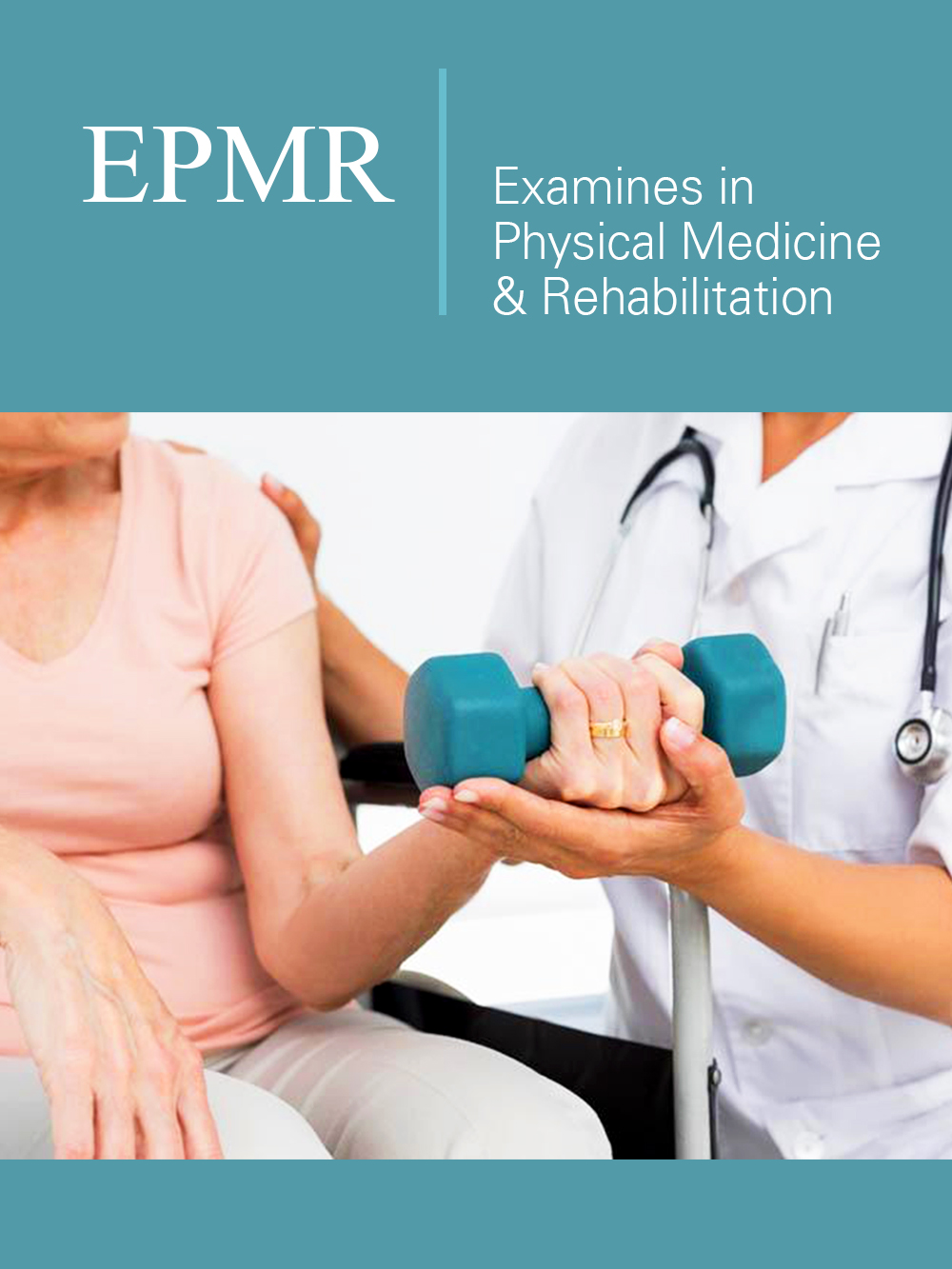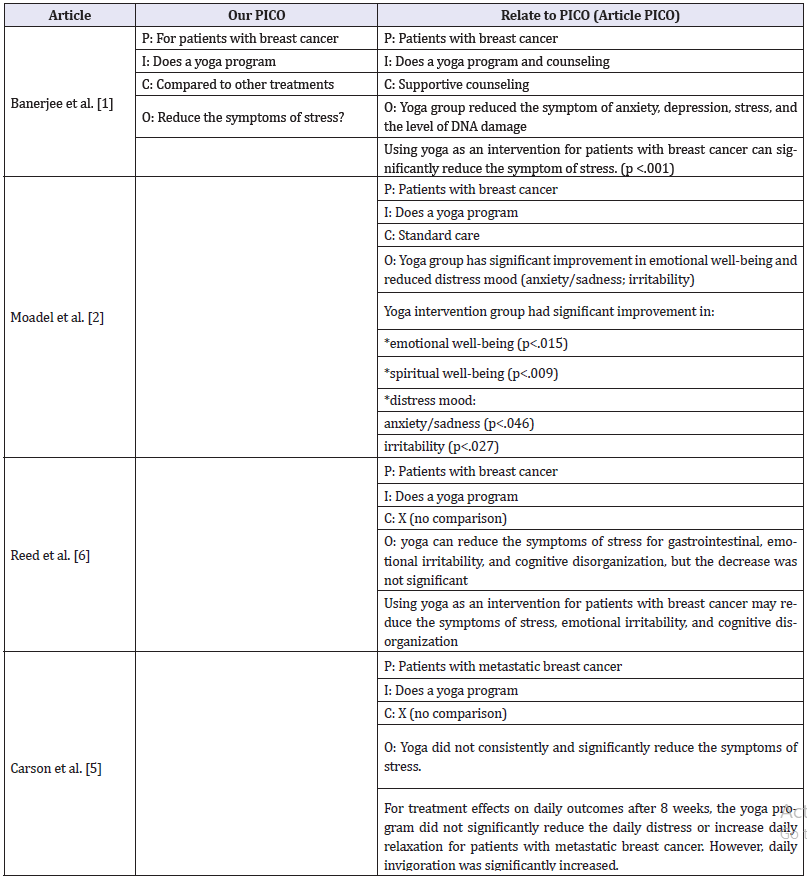- Submissions

Full Text
Surgical Medicine Open Access Journal
The Effectiveness of Yoga on Patients with Breast Cancer in Reducing Symptoms of Stress: Evidence- Based Review
Hassan Izzeddin Sarsak*
Department of Occupational Therapy, School of Rehabilitation Sciences, University of Jordan, Jordan
*Corresponding author:Hassan Izzeddin Sarsak, Department of Occupational Therapy, University of Jordan, Jordan, Batterjee Medical College, Saudi Arabia
Submission: October 09, 2018;Published: October 17, 2018

ISSN 2637-7934 Volume2 Issue1
Abstract
This study was conducted to examine the scientific evidence regarding the effectiveness of yoga intervention on stress reduction for patients with breast cancer. PICO method was used to develop research question and a thorough review was conducted to identify most relevant evidence-based research related to the effectiveness of yoga on patients with breast cancer in reducing symptoms of stress. Our review revealed four studies suggesting that yoga exercises may reduce stress related symptoms associated with breast cancer patients. Yoga exercises are effective and helpful and could reduce symptoms of stress in patients with breast cancer.
Keywords: Yoga; Breast cancer; Stress; Distress mood
Introduction
Patients with breast cancer may have psychological and physical discomfort. Emotional responses may create barriers that prevent these patients from fully participating in their daily routines. Yoga enhances the patient’s ability to cope with their stressful situation Banerjee [1] & Moadel [2]. The purpose of this study was to examine the scientific evidence regarding the effectiveness of yoga intervention on stress reduction for patients with breast cancer. For this study, we created a clinical/research PICO question (Population, Intervention, Comparison, and Outcome), a key to evidence-based decision Richardson et al. [3]. The PICO formed for our study is as follows:
P: For patients with breast cancer
I: Does a yoga program
C: Compared to other treatments
O: Reduce the symptoms of stress?
Methods
Review of literature and search strategy- A research has been made in the following databases: Ovid (MEDLINE, Psych INFO, and Global Health), and CINAHL. Keywords and Search items used to search articles for our study were Yoga, breast cancer, stress, distress mood. Four articles were selected related to the effectiveness of yoga on patients with breast cancer in reducing symptoms of stress. All articles were related to our PICO question. After all, the strongest evidence-based article was chosen using hierarchy of levels of evidence in evidence-based practice Hughes [4].
Results
Table 1 & 2 show a summary of the four articles in relation to our PICO.
Table 1:A summary of reviewed articles in relation to our PICO.

Table 2:Summary of reviewed articles.

Discussion
Banerjee et al. [1] which examined the effects of an integrated yoga program in modulating psychological stress and radiationinduced genotoxic stress in breast cancer patients undergoing radiotherapy was selected as the strongest evidence in our study. It was a level II randomized control trial (RCT) with significance level of P <.001 after 6 weeks. Thus, clinical guidelines, recommendations, a plan and audit tool have been developed in our study to implement yoga in clinics (Table 3).
Conclusion
Our review suggested that yoga exercises are effective and helpful and could reduce symptoms of stress in patients with breast cancer [5,6]. Thus, clinical guidelines, recommendations, a plan and audit tool have been created in our study to implement yoga programs in clinics. The clinical guidelines for recommended intervention, the plan, and the audit tool recommend therapists to apply yoga exercises with patients with breast cancer and stress.
Table 3:A summary of recommendations, plan, and audit tool.

References
- Banerjee B, Rao R, Gopinath KS, Kumar A, Hegde S (2007) Effects of an integrated yoga program in modulating psychological stress and radiation- induced genotoxic stress in breast cancer patients undergoing radiotherapy. Integrative Cancer Therapies 6(3): 242-250.
- Moadel AB, Shah C, Rosett J, Harris MS, Patel SR, et al. (2007) Randomized controlled trial of yoga among a multiethnic sample of breast cancer patients: effect on quality of life. Journal of Clinical Oncology 25(28): 4387-4395.
- Richardson WS, Wilson MC, Nishikawa J, Hayward RS (1995) The wellbuilt clinical question: a key to evidence-based decision. ACP Journal Club 123(3): A12-A13.
- Hughes I (2006) Action research in healthcare: what is the evidence? ALAR Journal 11(1): 29-39.
- Carson JW, Carson KM, Porter LS, Keefe FJ, Shaw H, et al. (2007) Yoga for women with metastatic breast cancer: results from a pilot study. Journal of Pain and Symptom Management 33(3): 331-341.
- Reed SN, Carlson LE, Daroux LM, Aldous S (2006) A pilot study of yoga for breast cancer survivors: physical and psychological benefits. Psycho- Oncology 15(10): 891-897.
© 2018 Hassan Izzeddin Sarsak. This is an open access article distributed under the terms of the Creative Commons Attribution License , which permits unrestricted use, distribution, and build upon your work non-commercially.
 a Creative Commons Attribution 4.0 International License. Based on a work at www.crimsonpublishers.com.
Best viewed in
a Creative Commons Attribution 4.0 International License. Based on a work at www.crimsonpublishers.com.
Best viewed in 







.jpg)






























 Editorial Board Registrations
Editorial Board Registrations Submit your Article
Submit your Article Refer a Friend
Refer a Friend Advertise With Us
Advertise With Us
.jpg)






.jpg)














.bmp)
.jpg)
.png)
.jpg)










.jpg)






.png)

.png)



.png)






